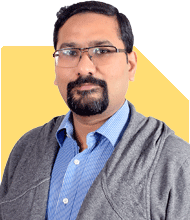Shekhar Kumar |117 Answers |Ask -Follow
Leadership, HR Expert - Answered on Apr 26, 2024
He has also mentored middle and senior management professionals for leadership positions and guided them in career development.
Shekhar has a bachelor's degree in business management from Magadh University, Bihar, and a master's degree in human resource management from Annamalai University, Tamil Nadu.... more

I am studying currrently in B.Sc in Physician Assistant from West bengal Govt.medical College . What is the career opportunities for this course in future?
As you consider these career options, it's essential to stay informed about emerging trends, advancements in healthcare technology, and changes in healthcare policies and regulations. Pursuing additional education, certifications, or specialized training in these areas can further enhance your qualifications and prepare you for future career opportunities in the dynamic field of healthcare.
You may like to see similar questions and answers below
Mayank Kumar |189 Answers |Ask -Follow
Education Expert - Answered on Apr 27, 2023
Aashish Sood |100 Answers |Ask -Follow
CAT, Management Expert - Answered on Sep 23, 2023
Mayank Chandel |497 Answers |Ask -Follow
IIT-JEE, NEET-UG, SAT, CLAT, CA, CS Exam Expert - Answered on Feb 27, 2024
Career Coach |38 Answers |Ask -Follow
Workplace Expert - Answered on May 05, 2024
Shalini Singh |64 Answers |Ask -Follow
Dating Coach - Answered on May 05, 2024
Ramalingam Kalirajan |1389 Answers |Ask -Follow
Mutual Funds, Financial Planning Expert - Answered on May 05, 2024
Ramalingam Kalirajan |1389 Answers |Ask -Follow
Mutual Funds, Financial Planning Expert - Answered on May 05, 2024
Ramalingam Kalirajan |1389 Answers |Ask -Follow
Mutual Funds, Financial Planning Expert - Answered on May 05, 2024
Ramalingam Kalirajan |1389 Answers |Ask -Follow
Mutual Funds, Financial Planning Expert - Answered on May 05, 2024
Ramalingam Kalirajan |1389 Answers |Ask -Follow
Mutual Funds, Financial Planning Expert - Answered on May 05, 2024
Moneywize |104 Answers |Ask -Follow
Financial Planner - Answered on May 05, 2024
Ramalingam Kalirajan |1389 Answers |Ask -Follow
Mutual Funds, Financial Planning Expert - Answered on May 05, 2024
Ramalingam Kalirajan |1389 Answers |Ask -Follow
Mutual Funds, Financial Planning Expert - Answered on May 05, 2024

























